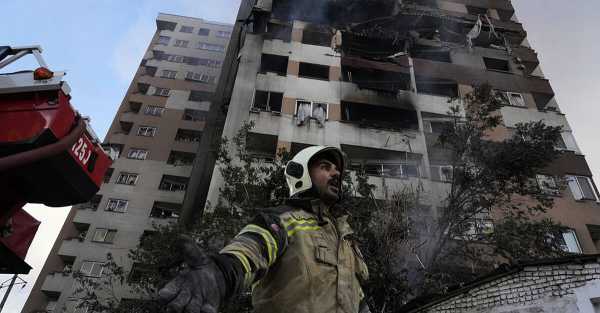
Iran carried out retaliatory airstrikes on Israel on Friday evening. Explosions were heard in Jerusalem and Tel Aviv, the country’s two largest cities. It was the largest military strike on Israel, targeting its longtime foe.
Air raid sirens sounded across Israel and authorities urged citizens to seek shelter. Rockets were spotted over the Tel Aviv skyline and the military said Iran had fired two salvos.
The U.S. military helped intercept Iranian missiles headed toward Israel, according to information provided by two U.S. officials on Friday.
In the Tel Aviv area, the Israeli ambulance service reported five people injured by shrapnel. Live broadcasts from Tel Aviv showed a rocket apparently hitting the city. A seriously injured woman was taken to Beilinson Hospital in nearby Petah Tikva, a hospital official said.
Unprecedented Israeli strikes on Iran and subsequent Iranian retaliation have raised fears of a widening regional conflict, even as Iran’s allies Hamas in Gaza and Hezbollah in Lebanon have been destroyed by Israel.
Iran’s state news agency IRNA reported that Tehran launched hundreds of ballistic missiles at Israel after Israel attacked a major underground nuclear facility in Natanz, killing senior military commanders. The Israeli military said Iran fired fewer than 100 missiles, most of which were intercepted or missed their targets.
Iran’s Supreme Leader Ayatollah Ali Khamenei blamed Israel for starting the war. A senior Iranian official said there would be no safe places in Israel and revenge would be brutal.
Israel’s operation “will continue for as many days as it takes to eliminate this threat,” Israeli Prime Minister Benjamin Netanyahu said in a televised address.
Netanyahu, a longtime advocate of warning about Iran’s nuclear program, said he authorized the air strike to stop Iran from building a nuclear weapon, something Israel and its Western allies have claimed Tehran was aiming at, though Iran denies it.
In a video released by his office, Netanyahu called on the Iranian people to rise up against their leaders. “I am with you, the Israeli people are with you,” he said.
“Generations from now, history will remember that our generation stood its ground, acted quickly and ensured our common future.”
Iran has long maintained that its nuclear program is for peaceful purposes only. This week, the UN nuclear watchdog concluded that Iran is in violation of its obligations under a global non-proliferation treaty.
US President Donald Trump said it is not too late for Tehran to stop Israeli bombings by reaching an agreement on its nuclear program.
Tehran had been negotiating with the Trump administration for a deal to curb its nuclear program in exchange for the one Trump abandoned in 2018. Tehran rejected the latest U.S. offer.
Attacks on Iran
Iranian media showed footage of destroyed residential buildings in Iran and reported that about 80 civilians were killed and more than 300 people were injured in the attacks on nuclear scientists in their beds.
The Israeli military reported striking Iranian missile and drone sites, as well as another nuclear facility in Isfahan.
An Israeli military spokesman has denied Iranian media reports that an Israeli fighter jet had been shot down and its pilot captured.
In a telephone interview with Reuters, Trump said nuclear talks between Tehran and the United States scheduled for Sunday were still on the agenda, although he was unsure whether they would take place.
“We all knew,” Trump said of Israel’s plans to attack.
“I tried to save Iran from humiliation and destruction. I really hoped to see an agreement reached,” T added.
Sourse: breakingnews.ie